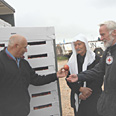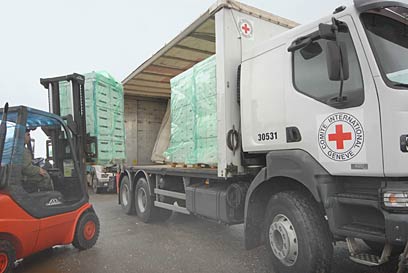

Some 7,000 tons of apples began making their way from Israel to Syria on Monday morning. For the third year running the convoy of fruit-filled trucks made its way through the Kunetra border crossing and from their to the markets of Damascus.
The ties between the Druze residents of the northern Golan Heights and Syria have remained close throughout the years; just recently they held a large demonstration on both sides of the border, marking 25 years since Israel annexed the Golan.
The Druze residents on the Israeli side demand the Golan be returned to Syrian rule. In the meantime the only thing crossing into Syrian hands are the apples.

Trucks carrying apples across the border (Photo: Aviyahu Shapira)
At 9 a.m. the border crossing was opened on the Syrian side and three Red Cross vehicles made the 300 meter journey to the Israeli side of the border. After a complete security check the produce was loaded onto the trucks at 11 am.
This year, to help battle the domestic apple surplus, Agriculture Minister Shalom Simhon decided to provide governmental aid to support the exporting farmers.
"Exporting to Syria is like exporting to any other country abroad. For that cause we have given the budget NIS 1.4 million (about $333.5). This is a 20 percent increase per kg of apples, these funds will help support the Druze farmers.
No to Jewish apples
In Syria, officials stated they were only interested apples grown by Druze farmers and not in Jewish towns. However the ministry of foreign affairs was hopeful that soon Israel will being exporting its cherries from the a kibbutz in the Golan Heights.
The operation is expected to last up to ten days.
The ministry of foreign affairs noted that the transfer was being considered as a humanitarian effort and that the decision was in response to those circumstances.
"Our interest is to aid the Druze farmers and help them get rid of their surplus," the ministry emphasized, stating that it was confident that the operation would be a success, as it was in previous years.
Lilach Shoval contributed to this report















